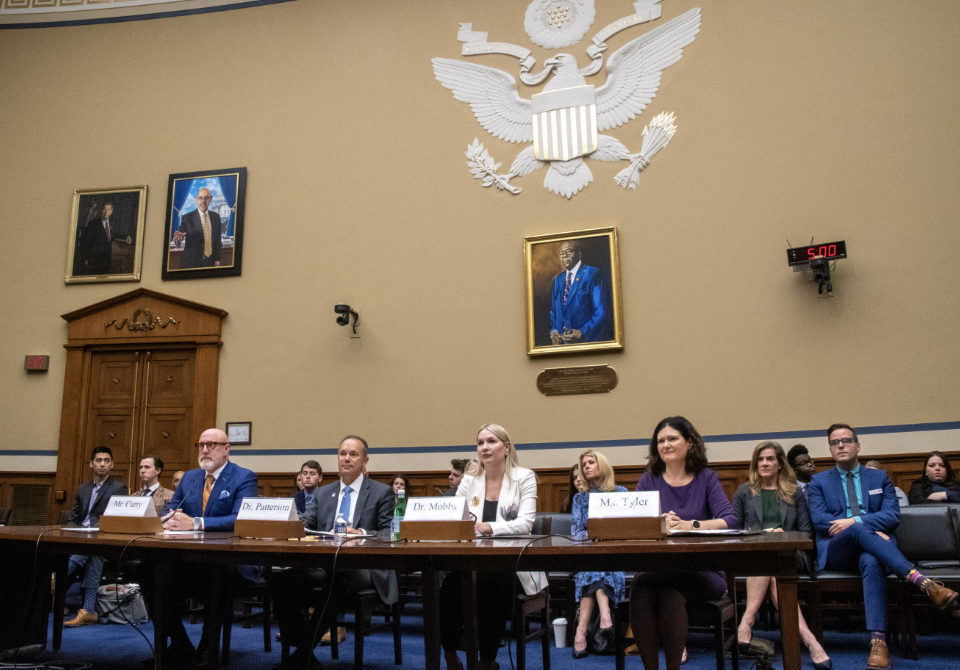WASHINGTON — Democratic and Republican lawmakers at a recent House hearing vowed to uphold religious freedom — yet disagreed about the biggest threats and whether that work should start at home or abroad.
Lawmakers in the House Oversight and Accountability Committee met on Wednesday to discuss the Biden administration’s role in preventing global religious persecution. Republican lawmakers focused on what they said were failures of the Biden administration in preventing religious persecution abroad; Democratic lawmakers stressed addressing Christian nationalism as a threat to religious freedom at home.
“Christian nationalism is a form of religious extremism making its way into our policies and undermining our democracy,” said Rep. Maxwell Frost (D-Fla.). “As a man of faith I know that Christianity is not Christian nationalism. I oppose my faith being used to whitewash a racist, violent and dangerous ideology.”
Remembering those who were killed in 2018 at the Tree of Life synagogue in Pittsburgh days before the five year anniversary of the mass shooting, Frost highlighted the role Christian nationalism has played in violent attacks across the nation.
Frost said Christian nationalism also poses an urgent threat to democracy, and witnesses at the hearing said it played a role in the Jan. 6 insurrection. Amanda Tyler, executive director of the Baptist Joint Committee for Religious Liberty, told the committee that Christian nationalism was “used as a permissive structure and a uniting ideology for people who were at the Capitol that day.”
Tyler said Christian nationalists infuse their religion into politics to justify their white supremacist beliefs.
“Christian nationalism is used by white supremacists to try to justify their violence,” Tyler said. “It uses the symbols and the language of Christianity to try to justify what is indefensible. It turns their hatred into a religious clause, something that they believe is ordained by God.”
Frost said he is fearful of Christian nationalism’s current role in Congress as he referenced his Republican colleagues’ comments about the ideology.
“Christian nationalism is actually a good thing,” Rep. Marjorie Taylor Greene (R-Ga.) said on X, then known as Twitter, in 2022. “It is an identity that Republicans need to embrace and I am being attacked by the Godless left because I said I am a proud Christian nationalist.”
Frost also cited Rep. Lauren Boebert (R-Colo.) and comments she made during a speech at a religious service in Colorado last year, in which she said, “I am tired of the separation of church and state junk that is not in the Constitution.”
Tyler told Sojourners she doesn’t believe the U.S. is equipped to tackle religious persecution abroad if it can’t face Christian nationalism at home.
“It’s really important for our credibility on the world stage as we are engaged in diplomatic relations with other countries, that we live up to our own values and standards about what religious freedom means,” Tyler said in an interview.
Rep. Jared Moskowitz (D-Fla.) accused Republicans of supporting former President Donald Trump in his involvement with Christian nationalists, neo-nazis, and white supremacist organizations, which offended Republican lawmakers.
“I found it offensive that the gentleman would make a broad statement like that,” Rep. Pete Sessions (R-Texas) said. “I think that he should back that up with an individual, but not a broad group. That would be inappropriate … and untrue.”
While Republicans and Democrats disputed white supremacy and Christian nationalism’s role domestically, both expressed their commitment to upholding religious freedom and preventing religious persecution.
“We cannot pass this on to our children,” Rep. Daniel Goldman (D-N.Y.) said. “I’m grateful that you are all here to discuss what has to be a unified anti-hate platform among all religions, all ethnicities and races, so that we get back to the foundational principles of this country.”


